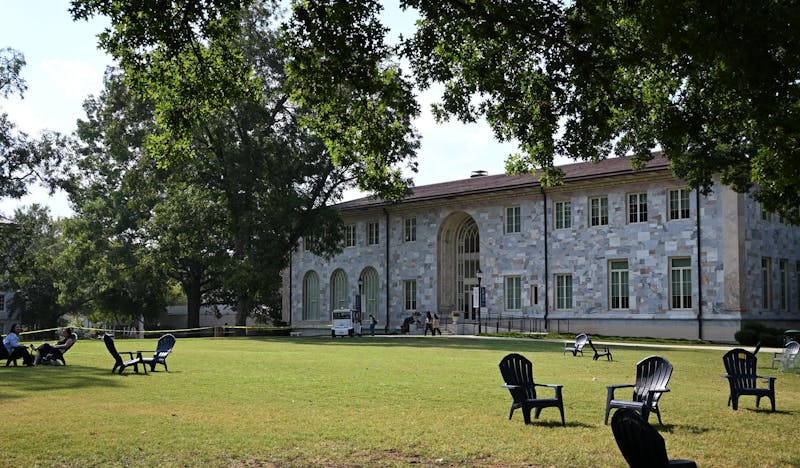Laughter spilled from lively debates over philosophical questions as Emory University undergraduates and graduate students mingled with professors over light refreshments. The buzz of conversation built an air of anticipation for the discussion ahead, moments before Carla Freeman, director of the Fox Center for Humanistic Inquiry (FCHI), took the stage to introduce the highlight of the night.Around 60 students and faculty came to the Emory Center for Ethics on Sept. 22 to celebrate Samuel Candler Dobbs Professor of Philosophy Lynne Huffer. In addition to commemorating her birthday, the audience gathered to learn about Huffer’s latest book, “These Survivals: Autobiography of an Extinction.”
Before Huffer took the stage, Philosophy Department Chair Andrew Mitchell and Director of Graduate Studies and Associate Professor of Art History Lisa Lee gave their remarks.
Freeman spoke first, discussing FCHI’s tradition of hosting book launches for all faculty in the humanities, which began two years ago.
“I’m a strong believer in ritual and celebrations,” Freeman said. “In any time, but especially in dark times, we should seize any opportunity we can to celebrate creativity.”
Following Freeman’s comments, Mitchell introduced Huffer and shared what he gleaned from her work. Due to the fragmented nature of the “These Survivals,” which intertwines collages and text, Mitchell described Huffer’s work as uncontainable and evergrowing as opposed to seeming like a single text.“It is about fragments and holes, to a certain extent, and there’s immediacy about that,” Mitchell said. “In reading the book, you come to realize how much of our own experience is fragmented.”
Huffer then took the microphone, sharing that various interests and social causes informed her text — from 20th-century French philosopher Michel Foucault to biology to feminist theory. She revealed that one of her inspirations behind writing about climate change and environmental issues was attending over 10 years of meetings with an Anthropocene reading group at Emory. Perspectives from scientists, social scientists and others in the humanities coupled with her extensive research of Foucault inspired Huffer to rethink her approach to history.
“Over the years, I’ve developed a take on Michel Foucault’s work that allows me to think about the Earth, archives and planetary time, or what’s known as deep time — geological time — through the lens of what Foucault calls genealogy, a method of writing that rethinks the present by approaching the past as fragmented, incomplete and radically discontinuous,” Huffer said.
Three years ago, Huffer took leave from Emory to attend a seminar on climate crisis politics at the Institute for Advanced Study at Princeton University (N.J.). During her year-long sabbatical, she worked on a book called “The Ethics of Extinction” but encountered various obstacles in the creative process. In a fit of frustration, Huffer cut and tore the printed pages, scribbled notes, lists and quotes, scattering them across the floor of her New Jersey apartment. She mounted the “vestiges of a somewhat destructive fit” onto her walls and continued fragmenting the media, drawing connections and coiling twine in zigzagged lines across the room.
“I didn’t know what I was doing,” Huffer said. “I was trying to figure out the structure of my book.And the lines grew of their own accord, it felt like they were alive.”
This process transformed her ideas from two-dimensional writing to three-dimensional art. “These Survivals” features over 120 color pictures of collages Huffer made during COVID-19, which she returned to during her research. Huffer borrowed much of the book’s material from outside sources such as photographs, artwork and the words of other philosophers.
“A lot of the book is borrowed text,” Huffer said. “ It’s literally a collage of voices.”
After the event, Huffer elaborated on how Emory students can apply the principles for creative expression she employed while writing “These Survivals.” She urged Emory community members to protect and embrace new types of [artistic, intellectual?] production.
“I would say give [yourself] permission to think outside the box, to engage in new practices that you might not have expertise in, to find that part of yourself that’s childlike and that wants to play and that wants to shake up how we do things,” Huffer said.
Noor Imran (30G), a Ph.D student in the Laney Graduate School, explained that she sees Huffer as an exceptional influence. According to Imran, it is inspiring to see an experienced academic incorporating creativity into her work.
“It’s very freeing for the students to see, because there’s a lot of fear to try new things and be outside of our comfort zone,” Imran said.
As the event wrapped up, with students and faculty resuming their conversation, Freeman noted that as an academic institution, Emory has a duty to uplift Huffer’s work.
“Celebrating the book at a time when we really want to ensure that students and the public are reading and engaging with serious ideas, this is the stuff of a university,” Freeman said. “This is what we do. This is what we do best.”

